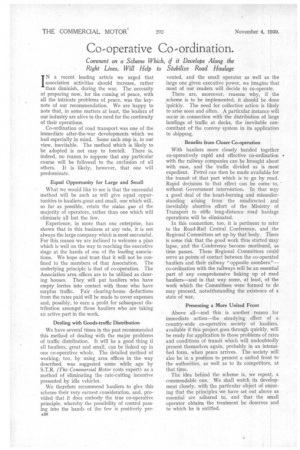Co-operative Co-ordination.
Page 22

If you've noticed an error in this article please click here to report it so we can fix it.
Comment on a Scheme Which, if it Develops Along the Right Lines, Will Help to Stabilize Road Haulage
IN a recent leading article we urged that association activities should increase, rather than diminish, during the war. The necessity of preparing now, for the coming of peace, with all the intricate problems of peace, was the keynote of our recommendation. We are happy to note that, in some matters at least, the leaders of our industry are alive to the need for the continuity of their operations.
Co-ordination of road transport was one of the immediate after-the-war developments which we had especially in mind. Some such step is, in our view, inevitable. The method which is likely to be adopted is not easy to foretell. There is, indeed, no reason to suppose that any particular course will be followed to the exclusion of all others. It is likely, however, that one will predominate.
Equal Opportunity for Large and Small What we would like to see is that the successful method will be such as will give equal opportunities to hauliers great and small, one which will, so far as possible, retain the status quo of the majority of operators, rather than one which will eliminate all but the few.
Experience, in more than one enterprise, has shown that in this business at any rate, it is not always the large company which is most successful. For this reason we are inclined to welcome a pan which is well on the way to reaching the executive stage at the hands of one of the leading associations. We hope and trust that it will not be confined to the members of that Association. The underlying principle is that of co-operation. The Association area offices are to be utilized as clearing houses. They will put hauliers who have empty lorries into contact with those who have surplus traffic. Fair clearing-house deductions from the rates paid will be made to cover expenses and, possibly, to earn a profit for subsequent distribution amongst those hauliers who are taking an active part in the work.
Dealing with Goods-traffic Distribution We have several times in the past recommended this method of dealing with the major problems of traffic distribution. It will be a good thing if all hauliers, great and small, can be linked up in one co-operative whole. The detailed method of working, too, by using area offices in the way described, was suggested some while. ago by S.T.R. (The Commercial Motor costs expert) as a method of eliminating the rate-cutting incentive presented by idle vehicles. .
We therefore recommend hauliers to give this scheme their very earnest consideration, and, provided that it does embody the true co-operative principle, whereby the possibility of control passing into the hands of the few is positively preAso vented, and the small operator as well as the large one given executive power, we imagine that most of our readers will decide to co-operate.
There are, moreover, reasons why, if the scheme is to be implemented, it should be done 'quickly. The need for collective action is likely to arise soon and often. A particular instance will occur in connection with the distribution of large landings of traffic at docks, the inevitable concomitant or the convoy system in its application to shipping.
Benefits from Closer Co-operation With hauliers more closely banded together co-operatively rapid and effective co-ordination • with the railway companies can be brought about with ease, and the traffic divided as is most expedient. Petrol can then be made available for the transit of that part which is to go by road. Rapid decisions to that effect can be come to, without Government intervention. In that way a good deal of the heart-burning and misunderstanding arising from the misdirected and inevitably, abortive effort of the Ministry of Transport to stifle long-distance road haulage operations will be eliminated.
In this connection, too, it is pertinent to refer to the Road-Rail Central Conference, and the Regional Committees set up by that body. There is some risk that the good work thus started may lapse, and the Conference become moribund, as time passes. These Regional Committees could serve as points of contact between the co-operated hauliers and their railway "opposite numbers "co-ordination with the railways will be an essential part of any comprehensive linking up of road hauliers—and in that way some, at least, of the work which the Committees were formed to do may proceed, notwithstanding the existence of a state of war.
Presenting a More United Front Above all—and this is another reason tor immediate action—the steadying effect of a country-wide co-operative society of hauliers, available if this project goes through quickly, will be ready for application to those problems of rates and conditions of transit which will undoubtedly present themselves again, probably in an intensified form, when peace arrives. The society will also be in a position to present a united front to the authorities, as well as to its competitors, at that time.
The idea behind the scheme is, we repeat, a commendable one. We shall watch its development closely, with the particular object of ensuring that the principles we have set out above as essential are adhered to, and that the small operator obtains the treatment he deserves and to which he is entitled.




























































